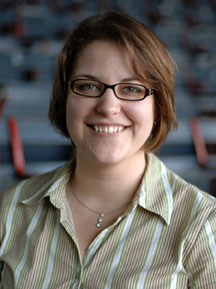Life 101: How I Survived My First Job — and Found My Amazing Second One
Part one: Sox photographer Phoebe Sexton (COM'06) on settling for less (for now)

BU Today asked a group of young alums how they made it through the obstacle course of everyday life — like working, budgeting, and dating — when they left BU behind and entered the real world. In this four-part series, we share their stories and tips. Check back tomorrow for Stacey Hughes (COM’05) on Money Matters — Why I Cut Up My Credit Cards, and Why You Shouldn’t Have To.
After graduation, I returned to a job I’d had the previous summer, working at Hunt’s Photo and Video. I worked in the Melrose, Mass., store, and mainly I sold cameras. It certainly wasn’t my dream job, but I knew that things could have been worse.
I had started to look for a real photography job in the middle of the second semester of my senior year, and it was a frustrating experience. For one thing, there was no way I could get a car, which is a necessity for a photojournalist, buy equipment, and have any money left at all. So it was really humbling, in a way, because I had to think practically and know that I couldn’t do whatever I wanted to do. It took me a while to convince myself that not going directly into a job at a newspaper, or someplace where I was taking pictures every day, was not a failure or a step down — it was just what I had to do to get to the next place.
I admit that I did get discouraged, a lot, because I was working too many hours, my commute was really long, and like any job in the service industry, be it waiting tables or working on commission sales, I had to deal with customers who were not always pleasant. December was a tough month because it’s the big sales season, and I had to work six days a week. For Christmas, I got only that day — Christmas — so it was the first holiday where I wasn’t able to go home to Iowa and see my family. That was tough.
One good thing was that I worked for nice people. If you’re stuck in a job that you don’t like, the make-or-break factor could be who you’re working for. Even though I was discouraged about how much time I was spending there every week instead of taking pictures, I enjoyed working with people I liked and respected. Also, the job paid pretty well, at least compared to the starting salary for a photojournalist. Within a few months, I was able to get equipment for myself cheaply and stay connected with photography while I tried to figure out my next move. I got a new camera, and I replaced all of my lenses, so I was able to do different kinds of shoots for a wide variety of people. There are still some things that I would like, but the essentials are covered, and they’re going to last me a good enough while. I would say, based on the deals and discounts, I saved roughly $3,000 on my photo equipment.
I worked at Hunt’s until January, when my photojournalism professor at BU, Peter Southwick, told me that he’d heard the Red Sox were looking for a new photography intern.
I applied for the job, and I’ve been the team’s photo intern for five months. When I learned that I’d gotten the job, I went out and bought a book on business etiquette, called Class Act, because as a photographer, I didn’t know what working in an office would be like. When I first bought it, I felt kind of like a dork, but it’s proving very helpful in terms of what the norms are for business attire and office conduct.
I take a lot more photos now, mainly of events in Fenway Park and of pregame ceremonies. I do a lot of printing for various events, I fill media requests for pictures, I’ve been working on an archiving system, and with my background at Hunt’s, I’ve helped the office acquire a new printer and make some sales decisions on equipment. I absolutely love it. The pay cut was pretty drastic, but I’m very happy and I get to take pictures every day.
So what have I learned in my first year out of college? I’ve learned that if you’re a superstar in college and if you do six million things that are all exactly what you want to do — just because you don’t continue that in the real world doesn’t mean that you’re failing. It took me a while to realize that I don’t have to be working for a huge newspaper and winning awards right out of college. You have certain things you need to go through to get to the next step. It was humbling, but realizing these things was also just being realistic and not too hard on myself. I was doing what I needed to do.
I don’t have any regrets in terms of where I worked or where I’m working. I was a lot more stressed out about everything going into graduation than I needed to be, now that I look back on it. It all works out, if you keep plugging away.